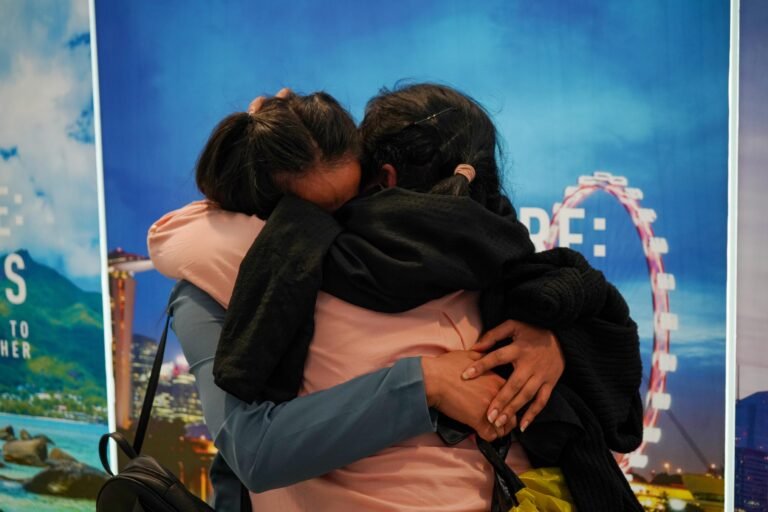When I met Fariba to discuss her story, I promised her that we’d make it clear that she used to have a good life in Iran. “People don’t believe me when I tell them that”, she says.
Fariba is from Tehran, where she lived with her husband and their three children. “I have lots of good memories.” “When I talk to my brother, we still laugh as we remember”.
She wants us to understand that people don’t leave home unless they have to. She had to flee to protect her young daughters.
“When people leave, they don’t have a choice.”
Her story is an example of the lengths that people have to go and the resilience that’s required to protect their families. It also emphasises the importance of finding high quality legal support, something that’s not available to so many families who need it.
You can read her story below.
We’re publishing her story as part of our winter fundraising campaign. To keep working with Fariba and her family and to make sure that other families can find the protection they need, we need to reach our target.
If you can help with a gift this Christmas, you can donate here: https://www.crowdjustice.com/case/bring-families-back-together/
Thanks,
Nick
*we’ve changed Fariba’s name to protect her identity
Fariba’s story
When Fariba’s eldest daughter turned 10, her father-in-law decided it was time for her to marry a 20-year-old man. She was still in primary school.
No parent could want this for their child. But her father-in-law had a lot of influence over her husband. “It was like having a dictator in the family”. Child marriage isn’t banned in Iran, so there was no protection available there.
“We had to leave”
To save her daughters, Fariba started to plan her escape with her brother and her father. She managed to leave with her children and they found themselves in Serbia.
They would walk all the way from Serbia to Greece.
The journey
This is an incredibly difficult journey, full of danger and risks. As a mother with three young daughters, they were very vulnerable.
One evening, as they were staying in the woods in North Macedonia, a man came and told her to come with her to buy things for the children. But he took her to a house where another man was waiting and sexually abused Fariba.
“I was suicidal after that. But the thing that kept me going was my children. I would look at my children and know that they were the reason that I left”.
Her daughters could see she was upset that night. She told her eldest daughter what happened years later, when she felt she was old enough to understand.
In Greece
In Greece, the family faced “other, new difficulties.”
After being cheated by an agent that her brother had arranged, Fariba and her daughters were forced to sleep in a park with a group of others in a similar situation. They spent three weeks there without finding anybody who spoke their language. “This was the worst time of my life”.
They managed to get by thanks to the kindness of a security guard at a local supermarket. He let them use the shop’s bathroom and also gave them food when he could.
Finally, she met an Iranian. “I was so happy to find someone speaking the same language”. He said he’d help, and took her to a squat where they could have some shelter and basic necessities.
A long, long process
The process of applying for asylum in Greece is a complicated one full of barriers. At the time when Fariba was first trying to apply, she had to follow an absurd system that involved contacting the authorities via Skype. They would never get through, no matter how many times they tried.
Fariba has been in Athens for years now. A good lawyer is vital in her situation, but she received bad advice and her previous lawyers weren’t always as persistent as they needed to be. One lawyer even submitted wrong information to the authorities.
It’s clear to us that she has a good case for asylum, but her claim was rejected multiple times before she started working with RLS.
This means that she was being forced to live without any documentation. She couldn’t work legally and they had to avoid the police, who could pick them up and put them in detention. Even the children were at risk of being detained in awful conditions.
“I was in a bad state. A bad state.”
She tells us that she’d lost hope when she first met our team. But Artemis, one of our lawyers, told her that she won’t give up, we’ll keep fighting for as long as it takes.
When we first left the court with Fariba after a hearing, she was overcome with emotion and started crying. “I was so grateful. I’d never had someone fight for us the way Artemis did.”
“I’ve had lawyers before, but they can’t compare. It’s a miracle for me, she gave me hope.”
What’s next
Due to the work of previous lawyers and incompetence of the authorities – who didn’t even look at a key document on her last application – Fariba’s case is a mess. It could take years.
We’ve now managed to help Fariba get back into the asylum process. To achieve this, we had to submit what’s called an annulment application against the previous decisions. This involved an appearance in court.
Even following this, we had to threaten a lawsuit to get their asylum cards due to the Asylum Service’s reluctance to follow the court order.
This card provides some security and means she can work and the children can go to school.
Her case shows how important it is to have someone by your side. Even the most basic requests can be a challenge.
We’ll keep fighting alongside Fariba and her daughters until they find the safety they need.
Hope for the future
She’s now looking to the future. Her children have missed a lot of school but have big ambitions.
Her eldest daughter wants to go on to become a dentist.
Fariba still thinks about what she left to make this change, “family, your country, your life. You lose respect. It’s not easy. Maybe it’s a mistake for myself, but it’s worth it because of my children.”
Asked what she thinks looking back at the last few years of her life, Fariba again demonstrates her resilience:
“We learnt a lot. How to be patient, grateful for everything we have. Our life is not perfect, but we’ve learnt to be grateful, patient and human. And being hopeful. We’re thankful for the things we have. I managed to save my children.”
You can help
We’ll keep working with Fariba for as long as she needs us, but we need your help to do so.
To keep providing our free, expert legal support, we need to meet our fundraising target.
If you can donate this Christmas, please do. When £30 can be enough to answer someone who needs help, every donation helps.
https://www.crowdjustice.com/case/bring-families-back-together/




